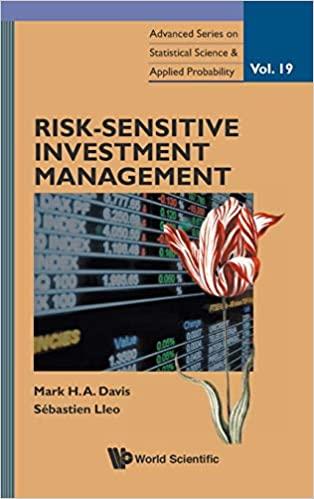Answered step by step
Verified Expert Solution
Question
1 Approved Answer
Covid-19, the numbers are already staggering. The 15-largest US banks have set aside $76bn to cover projected bad debts and their 32-biggest European cousins 56bn,
Covid-19, the numbers are already staggering. The 15-largest US banks have set aside
$76bn to cover projected bad debts and their 32-biggest European cousins 56bn, Citigroup
data shows. The combined total of $139bn in loan-loss provisions is the highest since the
$186bn reached in the second half of 2009, the nadir of the financial crisis that brought
down Bear Stearns and Lehman Brothers. Using a wider sample of banks, consultants at
Accenture warn that the estimated losses from bad debts could rise to $880bn by the end of
2022. Loan-loss provisions have been increased by new global accounting rules a
consequence of the financial crisis forcing lenders to build reserves well in advance of
defaults, particularly in the US where they must now provide for lifetime losses based on the
latest economic outlook.
Vikram Pandit, Citigroup chief executive between 2007 and 2012, argues that this time
like-for-like losses should be lower because consumers learnt from the tough times they
endured 12 years ago. They are being quite prudent, theyre using some of this money
theyre getting from the government to pay down debt, to reduce their balances, theyre
spending a little bit less, he says. Banks will not bear the full brunt of escalating defaults.
The UK governments emergency small-business lending programme where as many as
half of the bounce back loans, with a combined cost of at least 34bn, are not expected to
be repaid puts taxpayers on the line for losses. Payment holidays on credit cards,
mortgages and rents are also masking the current stress on loan books. JPMorgan wrote off
just $1.6bn of loans in its $998bn lending portfolio in its second-quarter results. The UKs
largest mortgage lender, Lloyds, has so far written off just 10.5m of its 38.4bn small
business loan book far below the average for the past three years even though
executives say bad loans could reach 5.5bn of its overall 440bn loan book this year. Its a
fools game trying to predict the ultimate credit losses from the crisis, says Jaime Ramos
Martin, a fund manager at Aviva Investors, which manages 356bn and is a major
shareholder in British banks. Now more than ever, its about picking the business models
that are right for the future and sticking with them. For those with big investment banking
operations, a surge in trading revenues derived from historically volatile markets combined
with fees from record corporate debt and equity issuance have softened the blow.
Investors remain sceptical. Uncertainty over loan-losses, concerns over revenues in
ultra-low-rate environments and bans on dividends and share buybacks have translated into
a mass sell-off of the sector. European bank stocks have plunged 39 per cent this year
compared with a 13 per cent fall in the benchmark Stoxx Europe 600 index. In the US, the
Nasdaq Bank Index has fallen more than a third, while the S&P 500 is flat for the year. That
has wiped out a combined $987bn in shareholder value, Citi data shows.
Banks have fulfilled their role in the macroeconomy this time, says Philipp Hildebrand,
who headed financial stability at the Swiss National Bank in 2008 and is now vice-chairman
of BlackRock, the $7.3tn asset manager. But in Europe at least, they have not performed
from a shareholder point of view. Even the most resilient have not been spared. Im
feeling a bit exasperated, admits Thomas Gottstein, chief executive at Credit Suisse,
referring to the negative reaction to his banks $1.8bn second-quarter profit, up 19 per cent
year-on-year. After these numbers, for our share price to be down?
European banks trade at an average 48 per cent of the book value of their net assets
compared with 89 per cent in the US. Centuries-old national champions Barclays (17.4bn),
Deutsche Bank (15.6bn) and Italys UniCredit (17.2bn) are collectively worth less than
Zoom, the $72bn (61bn) videoconferencing company founded in 2011.
Barclays and HSBCs second-quarter net income plunged 91 per cent and 96 per cent
respectively. In the US, $9.5bn of credit charges including loan loss provisions pushed
Wells Fargo to a $2.4bn loss, while profit fell more than 50 per cent at Citi, Bank of America
and JPMorgan. With little prospect of boosting revenues, executives must cut costs to
protect already anaemic profits, particularly in Europe. HSBC and Deutsche Bank suspended
previously announced redundancies in March, but less than two months later, lay-offs
resumed and deeper cuts were promised. Bank management has been focused on survival
until now, avoiding banana skins and appearing socially useful, which theyve done very
well, says Stuart Graham, founder of Autonomous Research. But as they come up for air
and look to 2021 and 2022, there is a lot of pressure to fundamentally readjust their cost
base, organically or through consolidation. If this crisis isnt the motivation to finally address
it, what is?
Fears for the global financial system peaked in mid-March when the $20tn market for US
government debt seized up, leading some to envisage a repeat of the bank collapses of 2008
and 2009. But this time, their loss-absorbing buffers held up.
The above information was obtained from the Finance Times article of August 10, 2020.
Using the information above please answer the following questions:
1) Describe the key concepts of bank safety?
2) Explain the overall purpose of the Basel accords?
3) Analyze the impact of Basel requirements on ROE?
4) Critically evaluate the difference between the current and the previous Basel
accords?
Step by Step Solution
There are 3 Steps involved in it
Step: 1

Get Instant Access to Expert-Tailored Solutions
See step-by-step solutions with expert insights and AI powered tools for academic success
Step: 2

Step: 3

Ace Your Homework with AI
Get the answers you need in no time with our AI-driven, step-by-step assistance
Get Started


